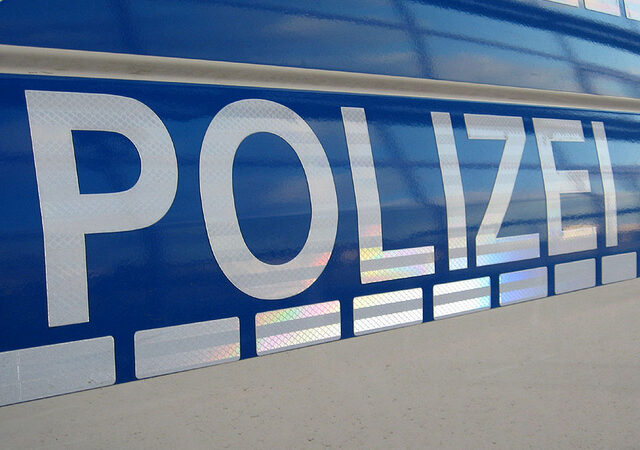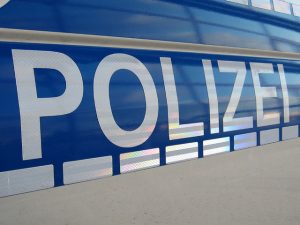A perfectly correct border control. No, sorry, identity control. Between Puttgarden and Oldenburg (Holst), 1105, Friday 1st March

 The 0744 København H to Berlin train (although I’m getting off at Hamburg Hbf). Friday 1st March. Two policemen wait at the German border station Puttgarden, board the train at 1040, it departs at 1042, and the two of them reach my seat (at the opposite end of the 4 car train) by about 1105, just before the train arrives in Oldenburg (Holst). This is the very same train and same spot as when I was checked in January.
The 0744 København H to Berlin train (although I’m getting off at Hamburg Hbf). Friday 1st March. Two policemen wait at the German border station Puttgarden, board the train at 1040, it departs at 1042, and the two of them reach my seat (at the opposite end of the 4 car train) by about 1105, just before the train arrives in Oldenburg (Holst). This is the very same train and same spot as when I was checked in January.
Today however I tried my new Schengen tactic. Rather than showing anything initially, I asked the policeman a question: is this a border control or an identity control? Doing this in German helped, as he was not annoyed. Identity control he told me. So it is OK for me to just show you my driving license then? He looked confused for a moment, and then realised the connection with the first question. I pushed, gently, stating that as far as I was aware an EU photo driving license was adequate as an identity in Germany. But the UK is not in Schengen he stated, looking at my UK driving license. No it’s not I confirmed, but that does not matter. It is still valid as identification in Germany.
But the problem, he correctly stated, is that while this driving license tells me that it is issued in the UK, it does not tell me that you are a British citizen. That is correct, I confirmed. So he reached for his telephone, and called HQ, giving them my surname and date of birth. This of course passed whatever check was done on the other end very swiftly.
But how do you speak such good German he asked me? I used to live in Berlin I replied, and by the way I work in EU politics, so that is why I am checking that Schengen is working. He smiled, thanked me, gave me my card back and wished me a pleasant journey.
So, what conclusions, if any, to draw from this?
A friend quipped to me in a text message that someone must have been reading my blog entries. I wish that were so, but I think that today I just ended up with an intelligent and polite police officer. The time it took for the police to go through the train indicates that more or less all passports must have been checked – this was a systematic check like they always are. As ever the question arises: how often, and on how many trains, are these checks taking place? But, as concerns the behaviour of the policeman towards me personally, it was done by the book and I can have no quibble with that.
@Ivania – this is a complicated area. A residence permit is normally *NOT* a valid document to cross from one EU country to another, but the circumstances under which anything else can be demanded are very restricted. Essentially border controls are not allowed in Schengen, so what you faced were identity controls that happened to take place on either side of the border. In those circumstances national ID law should apply and, at least on the German side, the resident card should have been enough.
Hi, I want to share my experiences with this EU internal border control.
Recently I was travelling from the Netherlands to Germany and then back on Eurolines bus. From NL to Germany, we were checked twice, once by the NL police and then the German police after we crossed the border. I showed them my NL residence permit (I’m a non-EU/EEA national) both times and nothing happened. However, on the way from Germany back to the Netherlands, we were stopped by (as they said) border control officers, and not police. I showed them my residence permit and the officer checking demanded my passport. It took some time for me to find my passport because it’s shoved somewhere in my backpack and so I asked if the residence permit was not enough, as I thought it is a valid ID card in the EU and was okayed the previous time. The guy said that it is not a travel document and so he won’t accept it (before proceeding to make ridiculing remarks).
I am admittedly not familiar with the EU border control laws, but the way I understood it, there should not be a border control in Schengen, and moreover a quite ridiculous claim by the officer saying that my residence permit does not allow me to cross the Germany-NL border?
@Uz – I’m afraid this sounds like typically bad behaviour at the border 🙁
You don’t say explicitly, but by the sound of it you were checked on the German side of the border, right? If so, then you would have to still show ID when it is demanded, but it does not have to be a passport or ID card in Germany. A driving license for example would also have been fine. But I am afraid that in Germany if police asks you for ID you are obliged to show them something.
Jon,
I’m a dutch citizen, and i was on the train crossing from the netherlands into germany when I was stopped by some kind of border control/police and was singled out for a “random check” and asked to see my passport. I wasn’t sure about my rights at the time so I complied. It took me a while to find my passport which created some tension. After seeing my passport the officer exclaims “Ah! Niederlander!” and they go on their way NOT CHECKING ANYONE ELSE.
Apparently since I don’t look “native” dutch, I am subject to “random” checks? What could I have done in this situation?
@Jon, I admire your tenacity on this question, but I think the rules are national and you would need to investigate in each country rather than relying on PRADO, which doesn’t I believe have the effect you suggest it has. (e.g. Germany may accept a driving licence as proof of identity, but I don’t see how it can oblige other member states to accept a German-issued driving licence as proof of identity.) Laws on this are a real minefield, and go to the heart of national idiosyncracies: for example, Belgian citizens can prove their identity to the police by other means than their ID card, but even if able to do so could then be fined for not producing their ID card. (And then of course there’s the difference betwen the letter of the law and real-life practice.)
In any case, the PRADO database is the public version. Police and border control agencies have access to the secure FADO version, which notably also includes details of a wide range of counterfeit documents which have been identified in member states. Driving licences would be included in PRADO to help car hire companies, for instance, verify their clients’ licences are not fakes. PRADO would also be the means by which banks verify passports for anti money laundering checks. (makes me wonder if there’s a database of utility bills for UK banks?)
I agree absolutely this is mostly a national issue, and that it is damned complicated. I’m trying to source answers on this here.
@Leon – agree. I am looking forward to trying this with a policeman in France and to see the reaction I get!
@Daniel – interesting, but not surprising, because – for rail just as for any other travel means – there are patterns to this, but not always what seem to be logical patterns. I am in the process of finalising a crowd-sourced website that will try to document all of this – it should launch in the next couple of weeks.
As for the driving license and Austria / Lithuania question you raise: the PRADO database (full database here determines what documentation is acceptable ID in all EU member states. The list for Lithuanian-issued IDs is here, and this list includes driving licenses. The format of photocard driving licenses in all EU Member States is the same – they never say the nationality, only the issuing country. So – in short – in Austria, an Austrian driving license should be equivalent to a Lithuanian license, and a police officer should accept either. If your wife is ever asked again she should ask the police officer for legal justification of the check.
Funny fact I noticed as I was quite frequently crossing the austrian-german and austrian-czech borders: Nobody ever wanted to see ID on the local trains, they seem to focus completely on the fast trains. So, if you are travelling illegal or want to smuggle stuff, you’d better take the slow trains.
Other thing I wonder about: Is what you wrote only applicable to Germany, or to any EU country? In Austria, me and my wife got ID-checked a while ago in a train, and we both showed our driving licenses. I have an austrian driving license, and by wife has a lithuanian one. The policepeople were happy with my austrian driving license, but not with the lithuanian one. Asked why, they said it doesn’t say the citizenship on it. At that moment, unfortunately I didn’t come up with that idea, but later I checked and saw that my austrian driving license doesn’t state my citizenship either.
You are awesome. Keep going, man!
Although I feel in general that members of the German police and/or border control are much politer than some of their European counterparts who often won’t tolerate that you stand up to them.
You yourself found out that the French police is much less keen on you questioning whatever it is they are doing.